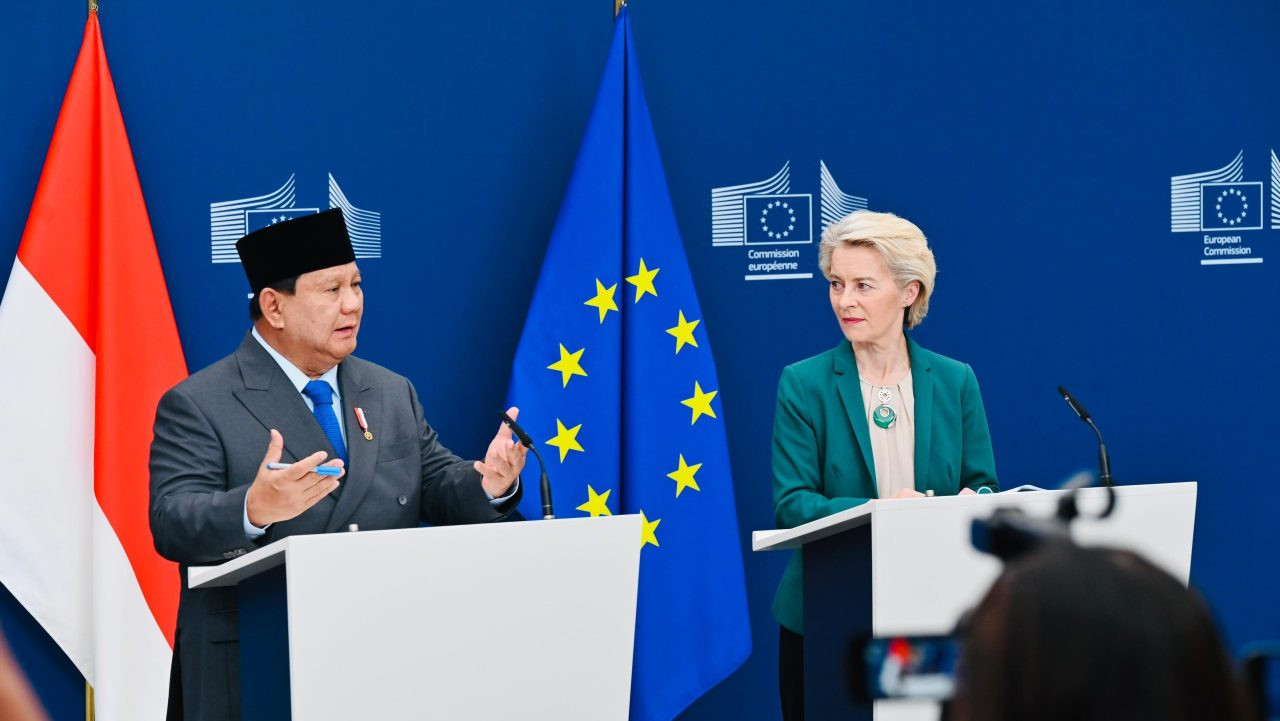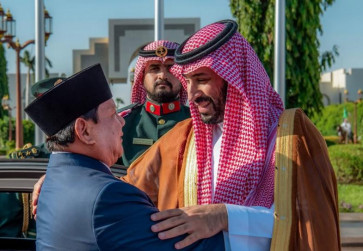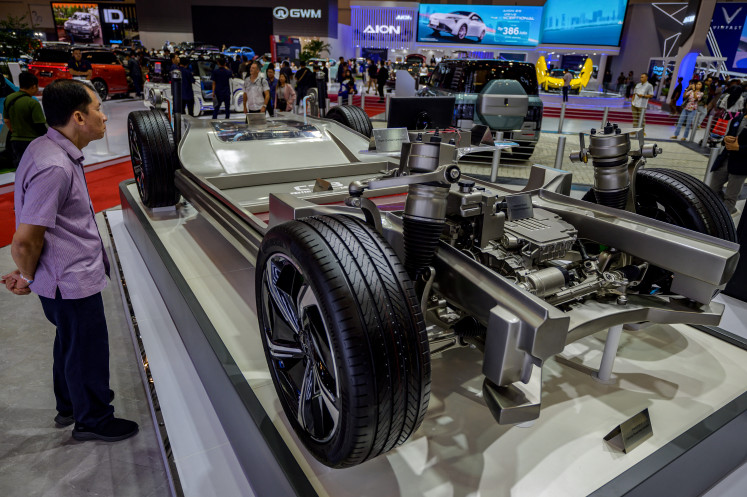Popular Reads
Top Results
Can't find what you're looking for?
View all search resultsPopular Reads
Top Results
Can't find what you're looking for?
View all search resultsEurope and Southeast Asia champion multipolar global order
More opportunities are needed for ASEAN and the EU to engage in strategic discussions on common interests, ranging from trade and climate action to the complex situation in the South China Sea.
Change text size
Gift Premium Articles
to Anyone
T
he next few months are poised to be decisive for Europe and Southeast Asia, and perhaps for the entire world. A unique opportunity is slowly taking shape, a rare space where some farsighted thinking could lay the foundations for a more robust and truly multipolar global order.
In an era of perilous instability and increased geopolitical risks, these two distinct regions have the potential to give impetus to new dynamics, significantly boosted by enhanced regional cooperation. Recent high-level discussions underscore this potential: High Representative/Vice-President Kaja Kallas delivered a powerful speech at the 32nd ASEAN Regional Forum in Kuala Lumpur, emphasizing the crucial role of cooperation and trust, while Indonesian President Prabowo Subianto, during his visit to European Union Headquarters in Brussels, offered high praise for Europe, highlighting its strategic relevance and, notably, its democratic credentials.
Considering the current global landscape, the fundamental values of cooperation and trust, along with all their underpinning principles, remain largely unappreciated and undervalued. In an era where dominant forces often dictate the rules, and not just referring to figures like United States President Donald Trump, a genuine multipolarity is needed.
The world yearns for true multilateralism founded on principled and just rule of law. It is too simplistic to frame the urgent need for a more multipolar order without first asserting that certain core principles and values should never be compromised. As we know, even the rule of law can be unjust when it disregards and downplays international human rights.
Both the EU and ASEAN, despite their imperfections, have the potential to lay the groundwork for a vision of multilateralism that more closely aligns with this ideal international order. The EU, a complex confederation, still has considerable internal work to do to reform and strengthen itself.
While its human rights record often serves as a model, undeniable shortcomings persist. Despite consistently espousing and embracing human rights, the EU and its member nations are still far from fully realizing their ambitious vision of a society where human rights are equally respected for all. Conversely, ASEAN was never created out of high-level moral principles. It never aimed for a mission of uniting people by upholding and respecting their human rights and democratic aspirations. Its genesis was pure pragmatism, as its five founding members came together primarily to avoid conflicts and skirmishes that could have escalated out of control.
Consequently, democracy and human rights were never at the forefront of ASEAN members' agendas, making it easier for initial bloc members to accept peers regardless of their democratic records.
Nevertheless, these two groups of nations possess a significant chance to help forge a new world order, where regionalism is valued and recognized as a powerful accelerator for reciprocal development and well-being. There is no better way to operationalize the aspirations of a more balanced world order, as pursued by initiatives like the Group of 20, than through close partnerships between regional blocs.
This means not only fostering closer relationships between ASEAN and the EU but also encouraging ASEAN to follow the EU's lead in building a more substantial global presence. ASEAN could forge new connections with the Pacific Ocean, Africa and Latin America, while continuing to build upon the progress made by Malaysia's chairmanship of ASEAN this year with the Gulf nations.
The Southeast Asian nations, through ASEAN, can pursue these new partnerships using soft power initiatives, engaging their peer groups worldwide by convening forums and issuing joint research on the most pressing issues of our era, from global warming to artificial intelligence. The EU can certainly support ASEAN in such endeavors.
Furthermore, let's not overlook the broader implications of the Indonesia-European Union Comprehensive Economic Partnership Agreement (IEU-CEPA) announced during Prabowo’s trip to Brussels. The deal is merely a stepping stone toward a more extensive regional agreement between the EU and ASEAN.
However, this larger goal will require time. In the interim, Europeans have another vital role: helping design and implement concrete initiatives that can genuinely capture the imagination of citizens across Southeast Asia. Currently, ASEAN's most ambitious regional project involves establishing a joint electricity grid.
The EU's Global Gateway, focused on infrastructure and just energy transition partnerships, can also bring more tangible developments. Even if these initiatives are not always glamorous, they offer practical benefits for the people of the region, but more is needed.
Southeast Asians need to begin perceiving themselves more as a united "constituency", part of a common fabric. The EU has, for several years, supported higher education projects, an ideal practical area to generate excitement among the new generations of Southeast Asian citizens. This is just one example of the practical implications of an enhanced partnership between the two regions.
However, more opportunities are needed for ASEAN and the EU to engage in strategic discussions on common interests, ranging from trade and climate action to the complex situation in the South China Sea. This is the most effective way to relaunch principled cooperation in an era where strongmen often seek to dominate.
Here, countries like Malaysia, Indonesia, Singapore and the Philippines can push for a much stronger dialogue. If President Prabowo genuinely follows through on the sentiments expressed in his speech with European Commission President Ursula von der Leyen, then creating more high-level interactions between the two blocs should not be difficult.
And if a full consensus among all ASEAN members for such an enhanced partnership with the EU is not immediately achievable, President Prabowo could lead a coalition of willing nations within Southeast Asia, a scenario not uncommon within the EU.
The EU also needs to take concrete steps independently. First, it should appoint an EU special representative for ASEAN, someone with the stature of a former head of government. If such representatives exist for regions like the Sahel and the Great Lakes, there is no reason not to have one exclusively focused on Southeast Asia.
Second, it is crucial to ensure that von der Leyen and Antonio Costa, the president of the European Council, can attend the upcoming ASEAN Summit in November. What is envisioned is a periodic gathering of all the heads of government from both the EU and ASEAN.
If both Southeast Asia and Europe aspire to prosper together, they must do whatever it takes to enhance trust and cooperation. These two elements, despite current challenges and disruptive forces, remain the most important currencies in the international order.
***
The author is a freelance writer who focuses on human rights, democracy and regional integration in the Asia Pacific.











